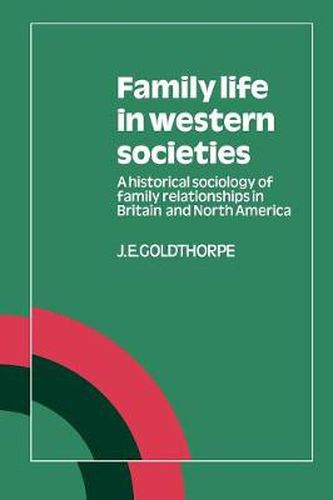Readings Newsletter
Become a Readings Member to make your shopping experience even easier.
Sign in or sign up for free!
You’re not far away from qualifying for FREE standard shipping within Australia
You’ve qualified for FREE standard shipping within Australia
The cart is loading…






This book was first published in 1987, offering a masterly review and synthesis of the available literature on family life in western societies. This book presents a distinctive approach to family sociology, focusing on two related questions: Why did we have the kind of family life we did when we did? and why did we have the kind of sociology of family life we did when we did? Goldthorpe employs a doubly historical perspective in which both ‘family life’, as opposed to ‘the family’, and sociological thought about family life, are alike seen as processes in time and in relation to each other. He draws on earlier sociological studies which he uses as historical evidence both for more recent changes in family life and for the evolution of sociological thought on the family. Meticulous in presenting both sides of controversies in family studies, and forthright in taking a clear position on all of them, Goldthorpe challenges many widely held preconceptions about family life. The book assumes little previous knowledge of sociology, and is easily accessible to students and other readers interested in understanding this fundamental aspect of human experience.
$9.00 standard shipping within Australia
FREE standard shipping within Australia for orders over $100.00
Express & International shipping calculated at checkout
This book was first published in 1987, offering a masterly review and synthesis of the available literature on family life in western societies. This book presents a distinctive approach to family sociology, focusing on two related questions: Why did we have the kind of family life we did when we did? and why did we have the kind of sociology of family life we did when we did? Goldthorpe employs a doubly historical perspective in which both ‘family life’, as opposed to ‘the family’, and sociological thought about family life, are alike seen as processes in time and in relation to each other. He draws on earlier sociological studies which he uses as historical evidence both for more recent changes in family life and for the evolution of sociological thought on the family. Meticulous in presenting both sides of controversies in family studies, and forthright in taking a clear position on all of them, Goldthorpe challenges many widely held preconceptions about family life. The book assumes little previous knowledge of sociology, and is easily accessible to students and other readers interested in understanding this fundamental aspect of human experience.